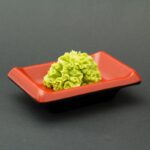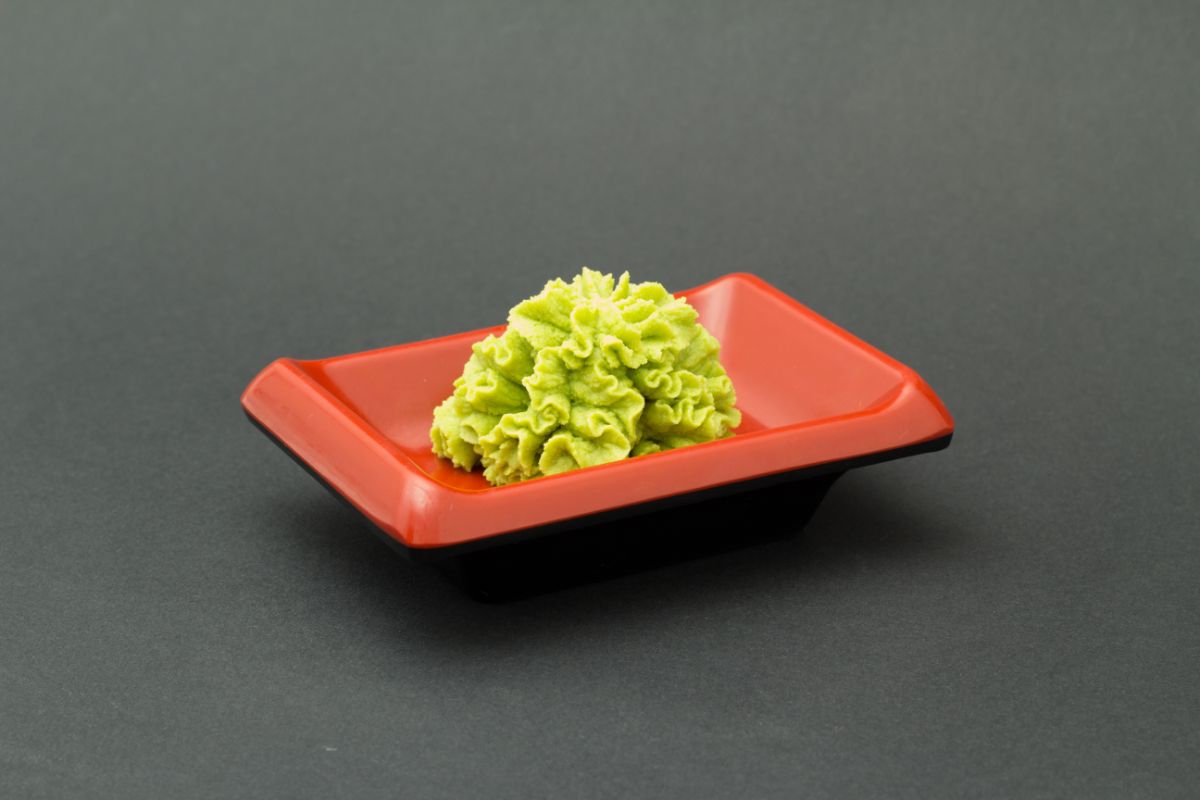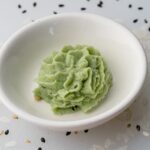Wasabi is a widely used ingredient in Japanese cuisine that comes from the Japanese wasabi plant. This product is known for its potent punch, with vapors that will clear your sinuses in moments. Yes – it’s spicy!
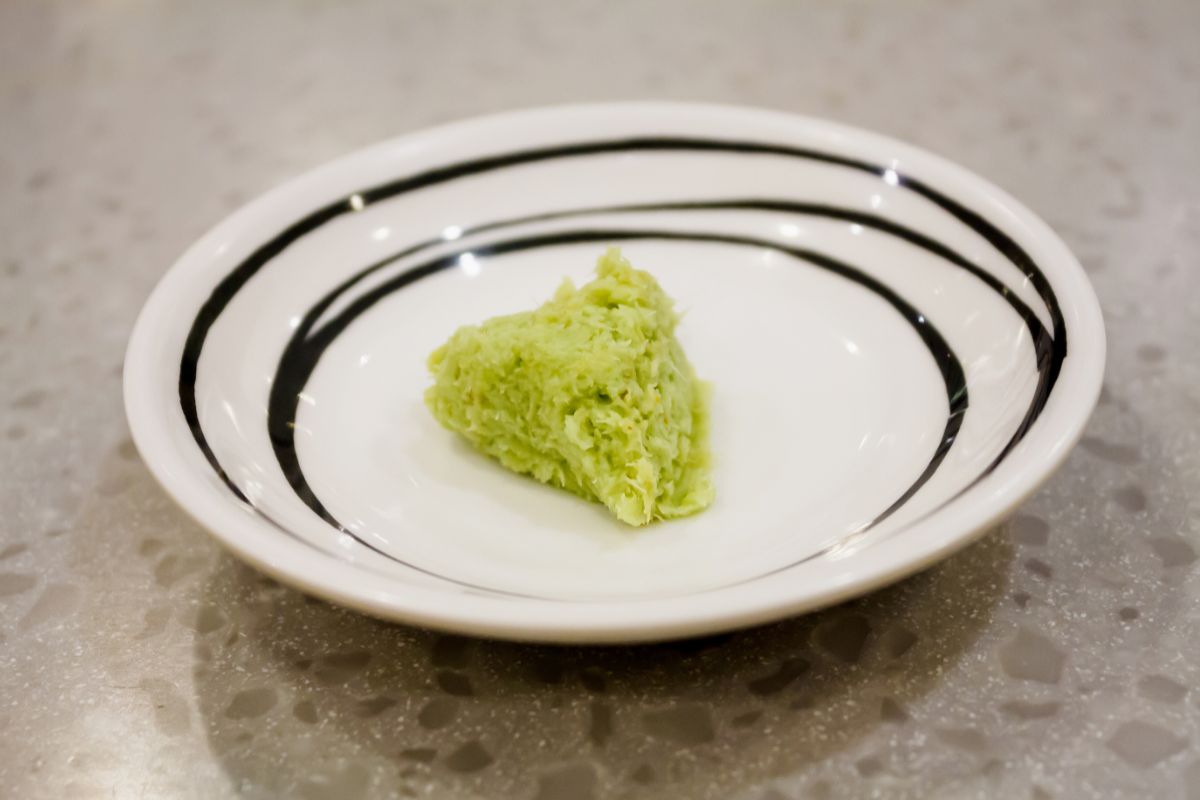
Because of how potent wasabi is, it’s only recommended to be enjoyed in small doses – a little goes a long way, and you probably want to keep your taste buds intact.
While this condiment is unlikely to cause any problems for most people, those with digestive disorders might not be so lucky.
Too much wasabi over an extended period of time could also cause gastrointestinal issues in some people, so try not to go too hard.
In this article, we will be exploring whether too much wasabi can hurt your stomach, and some of the potential health benefits of this plant. So, stick around, because the answers to these queries might actually surprise you!
Can Eating Too Much Wasabi Hurt Your Stomach?
Should you have an allergy to wasabi then that can cause stomach problems. The allergic response typically results in wheezing, diarrhea, and stomach pain.
It is unlikely that these symptoms persist into the long-term but they could be painful for a few hours. For some, the sheer pungency of wasabi can lead to heartburn, a burning sensation, a seizure, and an upset stomach.
Wasabi is a pungent and spicy condiment so you should eat it in tiny amounts. It can worsen gastritis, trigger indigestion and heartburn, as well as trigger acid reflux.
The condiment can be problematic for those with hemorrhoids and cause an asthma attack or laryngospasm.
Worsening Gastritis
Known side-effects of eating wasabi can include worsening any existing gastritis. This can occur if the stomach lining is irritated by an aromatic compound in the wasabi known as allyl isothiocyanate.
The compound is largely responsible for the plant’s pungent flavor and is a natural irritant which protects the plant from being eaten.
If you do have a tender stomach, you should try to avoid wasabi as it can trigger gastritis on its own, even if you do not have an existing condition.
Possible Indigestion And Heartburn
Wasabi can also cause indigestion and heartburn as it can irritate sensitive mucous membranes in the digestive system. The burning sensation can become painful if the wasabi irritates the esophagus.
An irritated stomach may even regurgitate its contents, including digestive juices, in the esophagus which would also burn the mucous lining and cause heartburn.
Triggering Acid Reflux
With its pungent, spicy flavor profile, wasabi can end up triggering acid reflux. This is more likely if the individual suffers from existing heartburn, stomach acidity, stomach ulcers, and gastritis.
These symptoms become more pronounced for pregnant women as they tend to suffer from acid reflux anyway. Furthermore, wasabi will contain hepatotoxin which can even damage your liver.
Problematic For Hemorrhoids
Wasabi is known to be particularly bad for those suffering from hemorrhoids due to its irritating nature yet there is some science behind that.
The wasabi can slow blood coagulation making it easier for the bleeding from the hemorrhoids to continue. This can result in an iron deficiency and even anemia solely from the irritation of the mucous membranes.
As the wasabi travels along an individual’s digestive tract, it can damage those sensitive blood vessels and cause bleeding that comes with pronounced pain.
Could Cause Asthma Attack And Laryngospasm
If an individual suffers from asthma then an asthma attack from eating spicy foods is not that uncommon.
As the mucous linings in the mouth and throat are irritated, this generates inflammation as mucus is produced which narrows the airways.
These conditions can act as a precursor for a laryngospasm and an asthma attack. If someone with those pre-existing conditions eats wasabi then the pungent spice can set them off and cause nasal congestion.
The Health Benefits Of Wasabi
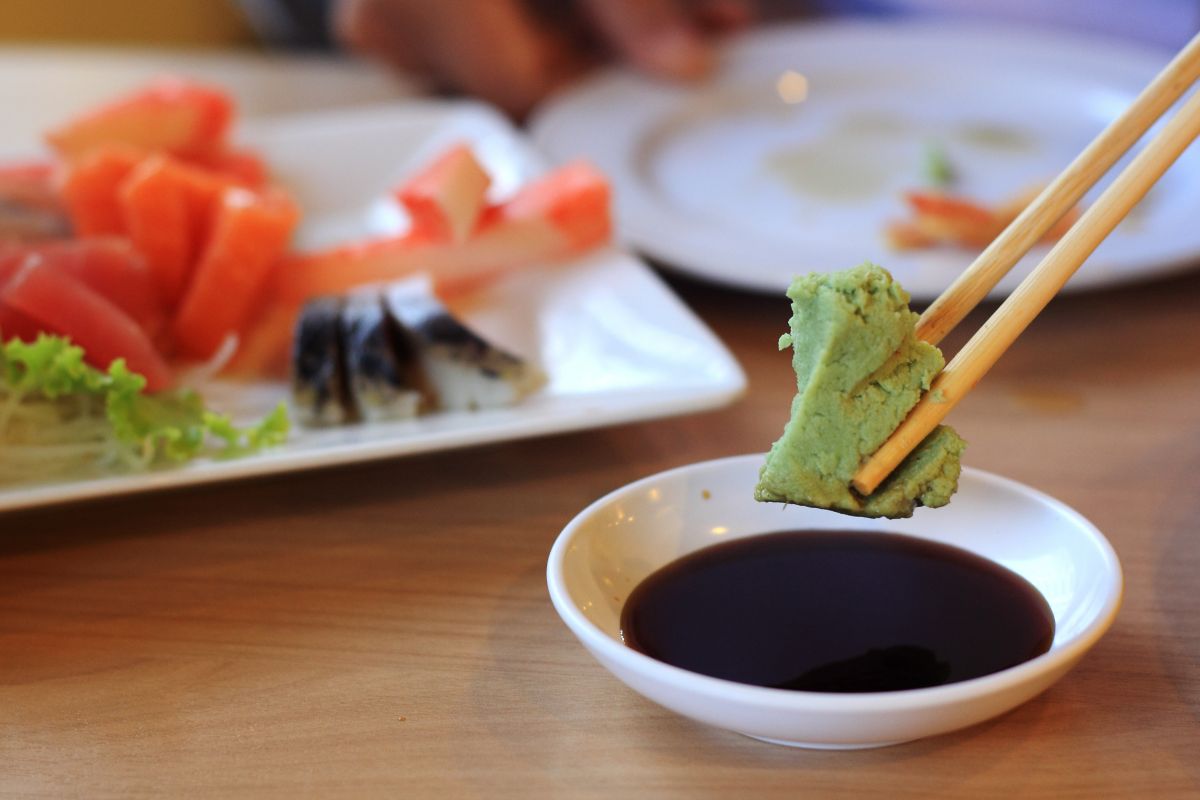
While eating wasabi can be problematic for anyone who suffers from pre-existing respiratory and digestive problems, it does have some health benefits.
These include opening up the nasal passages, antibacterial effects, and anti-hypercholesterolemic properties.
Opens Up The Nasal Passages
You should notice that when you eat even a tiny bit of wasabi, it should feel like it is clearing your nasal passages. In fact, wasabi is known to help address respiratory problems and provide a defense against respiratory tract pathogens.
This is due to the gaseous release of allyl isothiocyanate which prevents the buildup of the pathogens that cause pneumonia and influenza.
Wasabi can aid cases of the common cold by stimulating your sinuses, opening up the nasal passages, and increasing airflow.
Antibacterial Effects
Wasabi is known to have an antibacterial effect against two widespread bacteria that can cause food poisoning. These are Staphylococcus aureus and Escherichia coli and wasabi can lessen the risk of some foodborne diseases.
Wasabi even has an antimicrobial agent that can combat possible pathogenic bacteria which can be found in raw sashimi. This is one of the reasons why wasabi is served alongside sashimi, not just to enhance the culinary experience
Wasabi leaves are also known to be a naturally occurring remedy for the stomach lesions that can be induced by H. pylori. This is a bacterium that can contaminate the stomach and small intestine.
H. pylori can be a primary underlying reason for stomach cancer, stomach lining inflammation, and peptic ulcers. By eating wasabi, you can combat the bacterium before it begins to cause any problems and illnesses.
Protect A Healthy Heart
Adding wasabi to your diet can also help prevent several cardiovascular issues due to its anti-hypercholesterolemic properties.
These can lower high cholesterol levels and reduce the risk of heart attacks and strokes. The isothiocyanates found in wasabi can also prevent the formation of blood clots which can be a leading cause of strokes.
Final Thoughts
When you do enjoy a portion of sushi, make sure that you eat only a small amount of wasabi at first.
That can be mixed with soy sauce to create a spicy dip, though if you feel that your throat or stomach are irritated then do not eat any more.
The condiment has several health benefits, including antibacterial effects and anti-hypercholesterolemic properties, while it can open up your nasal passages.
However, it can also hurt your stomach, trigger acid reflux, worsen gastritis, and cause possible heartburn and indigestion.
Frequently Asked Questions
The typical wasabi paste that you are served will not actually contain any true wasabi. If you can find actual wasabi then it should be more expensive and can be used as a condiment, or as a herb, or a spice.
As well as eating it with sushi, you can add it to noodle soup, dressings, dips, and marinades. You could use it as a condiment when serving grilled vegetables or meats, or even as a flavoring for roasted vegetables.
Wasabi belongs to the same family as horseradish, mustard, and radishes so is naturally spicy. This is a special kind of spice as the pungency does not remain in your mouth like it would with turmeric or hot chili peppers.
Eating wasabi paste will release aromatic compounds then travel through your nasal passages. This should irritate your mucous membranes and produce a burning sensation that can be quite painful
- 16 Best Websites To Watch Japanese Movies With English Subtitles - May 11, 2023
- Is ZIPAIR The Best Airline For Traveling To Japan? - May 11, 2023
- Ryu Murakami Vs Haruki Murakami – Which One Should You Read? - May 11, 2023

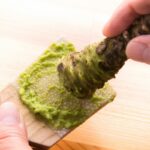
![How To Eat Wasabi The Japanese Way [Ultimate Guide] How To Eat Wasabi The Japanese Way [Ultimate Guide]](https://justaboutjapan.com/wp-content/uploads/2023/03/How-To-Eat-Wasabi-The-Japanese-Way-Ultimate-Guide-150x150.jpg)
